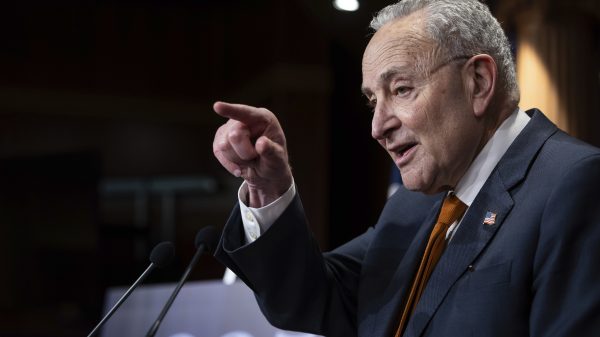GOP leaders are staring down two bad options to solve President-elect Donald Trump’s debt-limit problem, after failing to execute his demand to lift the federal borrowing cap in the last government funding bill.
One path requires full buy-in from Republican lawmakers to address the issue via budget reconciliation — a huge challenge thanks to the party’s fierce fiscal hawks. The other entails winning over Democrats, who for the most part rejected Trump’s initial debt-limit gambit last week.
“Whoever advised the president that it was even possible needs to better understand how this place works,” Sen. Thom Tillis (R-N.C.) said about Trump’s latest push to raise the debt limit.
It’s going to be an urgent issue for Trump as soon as he takes office. The federal government will resume the cap on its borrowing authority on Jan. 1, as the U.S. sits on a national debt of more than $36 trillion, though the Treasury Department can buy time for a number of months with so-called extraordinary measures. The fiscal time bomb illustrates the struggle Trump and Republican leaders face heading into 2025, as they consider whether to court Democrats who will want concessions or their own conservatives who are known for rigidly sticking to their demands to cut funding.
“I’ve told my caucus, if they try to do it under reconciliation, they’ll lose my vote,” Sen. Rand Paul (R-Ky.) said on Friday. “I told them: You want to kill reconciliation, put something on that we don’t like.”
It’s going to be a huge challenge for Republicans to raise the debt ceiling on their own. In exchange for increasing it by $1.5 trillion, House GOP leaders have told conservatives they’ll look for $2.5 trillion in cuts to mandatory spending — the bucket of money that controls things like SNAP nutrition assistance, Social Security, Medicaid and Medicare — in an upcoming reconciliation bill. That legislation is also supposed to deal with huge party priorities on border security, energy and taxes, which Republicans also say they’ll find a way to pay for. And, as Paul illustrates, fiscal conservatives are already voicing opposition to handling the debt limit through that party-line process.
Paul said he thinks other Senate conservatives have also told GOP leaders they won’t vote for a reconciliation package that raises the debt limit. With a 53-seat majority in the Senate next year, opposition from just a few Republicans will sink those dreams.
Getting Republicans to agree on $2.5 trillion in cuts to mandatory programs over 10 years would also be a challenge for GOP leaders. Trump has ruled out reductions to Social Security and Medicare, the costliest of the programs. Of the roughly $4 trillion the U.S. government spends on mandatory programs each year, Social Security benefits alone total almost $1.5 trillion.
Democrats say the proposal is a public relations nightmare for the GOP.
“Listen, this is the gift that keeps on giving,” Sen. Chris Murphy (D-Conn.) said. “This is the absolute worst case for the country — a massive tax cut for the richest of the rich, paid for by slashing, to the bone, health care for seniors and poor kids.”
Raising the debt limit by $1.5 trillion, even with corresponding funding cuts, would not keep the nation from hitting the borrowing cap for long. The U.S. budget deficit, the gap between how much comes in from revenue like taxes and how much is spent, was $1.8 trillion in the fiscal year that ended in September. Congress’ nonpartisan budget scorekeeper projects that interest payments on the national debt will total almost $900 billion next year.
And the timing for when Congress will absolutely need to address the debt limit is tricky, adding to the challenge for Republican leaders.
After the debt ceiling is reinstated on Jan. 1, the Treasury Department will immediately deploy the typical “extraordinary measures,” cash-shifting accounting tactics to ensure the country can continue to pay its bills for at least a few months longer. Then a surge of revenue will begin to flow into federal coffers when tax filing season begins at the end of January, keeping the U.S. from hitting its borrowing limit for a few more months.
All the while, the Treasury secretary will keep refining an “X-date” prediction for when the U.S. would default on its loans without action from Congress. Last year, money from taxes came in far lower than predicted, suddenly speeding up the forecast default date to early June, after lawmakers had assumed they had until August or September to pass a fix.
“Extraordinary measures will extend what the actual, true, de-facto deadline is. But we saw just last year that can vary wildly,” noted Pennsylvania Rep. Brendan Boyle, the top Democrat on the House Budget Committee.
Boyle has long pushed for passage of a bill that would let the Treasury Department continue paying the nation’s bills, despite the debt ceiling, similar to the proposal outgoing Senate GOP leader Mitch McConnell floated during previous standoffs over raising the U.S. borrowing limit. But many fiscal conservatives are opposed.
“I want to keep the debt limit. I like it,” Sen. Ron Johnson said last week.
The Wisconsin Republican said he is also opposed to raising the debt limit through reconciliation and plans to roll out a “debt ceiling budget” in early 2025 that illustrates how the national debt has “grown grotesquely” above inflation and population growth in recent years.
Raising the risk of a debt-limit crisis is less advantageous for Republicans as the GOP takes control of the White House and both chambers of Congress, especially as Trump so adamantly insists on swift action and has even called on lawmakers to “terminate” the nation’s borrowing cap altogether. But Democrats warn that slim GOP majorities and demands from fiscal conservatives keep alive the specter of economic catastrophe.
“When they have the trifecta, there’s really no point — other than old bad habits — to threatening the economy with the debt limit,” said Sen. Sheldon Whitehouse (D-R.I.), outgoing chair of the Senate Budget Committee.
“It’s the bear trap in the bedroom Republicans love to leave around for negotiating purposes,” Whitehouse added. “Now that they’ve got the trifecta, it loses some of its negotiating appeal and remains extremely, extremely dangerous.”




















